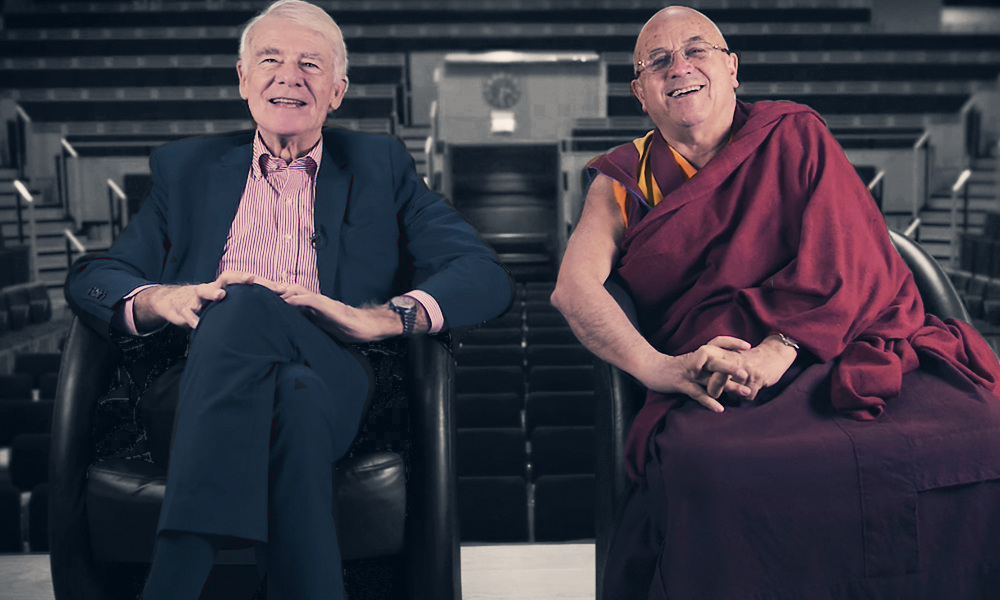Insights on Meditation and the Unconscious: Buddhist Monk and Neuroscientist Dialogue
핵심 개념
The authors explore the intersection of Buddhism and neuroscience to understand the unconscious mind and meditation's role in resolving inner conflicts.
초록
In a dialogue between Matthieu Ricard, a Buddhist monk, and Wolf Singer, a neuroscientist, they discuss the unconscious mind and meditation. Ricard emphasizes freeing oneself from afflictive thoughts through pure awareness, while Singer delves into the complexities of subconscious processing. They debate the efficacy of meditation in resolving conflicts inaccessible to conscious processing, highlighting contrasting views on addressing inner turmoil.
요약 맞춤 설정
AI로 다시 쓰기
인용 생성
소스 번역
다른 언어로
마인드맵 생성
소스 콘텐츠 기반
소스 방문
thereader.mitpress.mit.edu
On Meditation and the Unconscious: A Buddhist Monk and a Neuroscientist in Conversation
통계
"Buddhism shares with science the task of examining the mind empirically; it has pursued, for two millennia, direct investigation of the mind through penetrating introspection."
"The capacity of the workspace is limited to four to seven different items."
"Perception is actually not as holistic as it appears to be."
인용구
"For Buddhism, the deepest, most fundamental aspect of consciousness is [a] sun-like awareness, not the murky unconscious." - Matthieu Ricard
"We scan complex scenes serially, and actually much of what we seem to perceive we are in fact reconstructing from memory." - Wolf Singer
핵심 통찰 요약
by The Mit Pres... 게시일 thereader.mitpress.mit.e... 01-24-2022
https://thereader.mitpress.mit.edu/meditation-and-the-unconscious-buddhism-neuroscience-conversation/
더 깊은 질문
How can Western therapies integrate elements of Buddhist meditation practices for more holistic approaches?
Incorporating elements of Buddhist meditation practices into Western therapies can enhance the overall effectiveness of treatment. For example, techniques such as mindfulness, loving-kindness, and compassion meditation can help individuals cultivate self-awareness, emotional regulation, and empathy. By integrating these practices into therapy sessions, individuals can learn to observe their thoughts and emotions without judgment, develop a greater sense of inner peace, and improve their relationships with others.
Western therapies could also benefit from incorporating the concept of non-attachment taught in Buddhism. By encouraging clients to detach themselves from their thoughts and emotions during therapy sessions, therapists can help them gain perspective on challenging situations and reduce reactivity. This approach aligns with cognitive-behavioral therapy's goal of changing negative thought patterns by promoting a more balanced view of oneself and the world.
Furthermore, Western therapies could adopt the Buddhist principle of impermanence to help individuals cope with change and uncertainty. Teaching clients that all experiences are transient can foster resilience and acceptance in the face of life's challenges. Integrating these concepts into therapeutic interventions can lead to more comprehensive healing by addressing not only symptoms but also underlying causes related to mental health issues.
What are potential drawbacks or limitations of relying solely on subconscious processes for decision-making?
Relying solely on subconscious processes for decision-making may have several drawbacks or limitations:
Lack of conscious awareness: Subconscious processes operate below the level of conscious awareness, making it difficult for individuals to understand why they make certain decisions or behave in specific ways. This lack of insight can hinder personal growth and self-improvement.
Influence by implicit biases: Subconscious processes are susceptible to implicit biases formed through past experiences or societal conditioning. These biases may lead individuals to make decisions that are not aligned with their values or goals without realizing it.
Limited capacity for rational analysis: Subconscious processing often relies on parallel mechanisms that consider multiple solutions simultaneously rather than following a linear logical process like conscious deliberation does. While this approach is beneficial in some situations requiring quick responses or complex considerations, it may overlook critical factors necessary for sound decision-making.
Inability to access stored memories consciously: Certain information stored in implicit memory remains inaccessible at a conscious level unless triggered by specific cues or contexts. This limitation restricts one's ability to draw upon relevant past experiences when making decisions consciously.
How can individuals strike a balance between confronting inner conflicts directly versus using meditative practices for resolution?
Finding a balance between confronting inner conflicts directly and utilizing meditative practices for resolution involves understanding when each approach is most appropriate:
1.Confronting Inner Conflicts Directly:
Direct confrontation is essential when there is an urgent need to address unresolved issues causing distress.
It allows individuals to explore root causes behind emotional turmoil through introspection or seeking professional guidance.
Confrontation promotes active problem-solving strategies that target specific sources contributing to inner conflicts.
2.Utilizing Meditative Practices:
Meditation offers tools for managing immediate emotional distress by cultivating mindfulness and detachment from overwhelming feelings.
It provides space for observing thoughts objectively without getting entangled in them emotionally.
Meditative practices promote long-term emotional regulation by gradually transforming habitual negative patterns into positive ones through consistent practice.
To strike a balance between these approaches:
Individuals should assess the urgency and severity of inner conflicts before deciding whether direct confrontation or meditative practices would be more beneficial at any given time.
Combining both methods strategically based on situational needs allows individuals to address immediate concerns while building sustainable coping mechanisms over time.
Regular practice combining direct confrontation with meditative reflection creates an integrated approach towards resolving inner conflicts effectively while fostering personal growth and well-being in the long run
0
